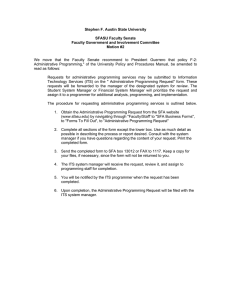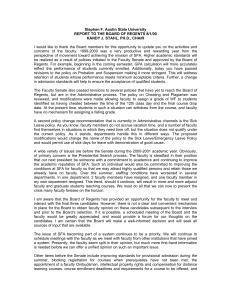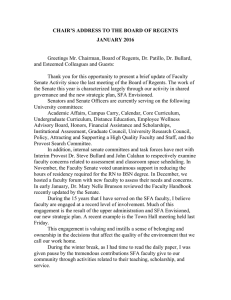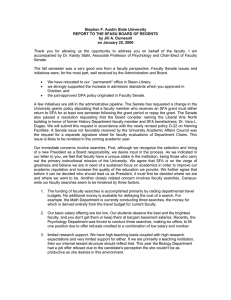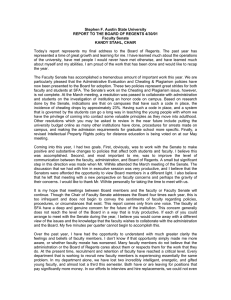On October 29
advertisement
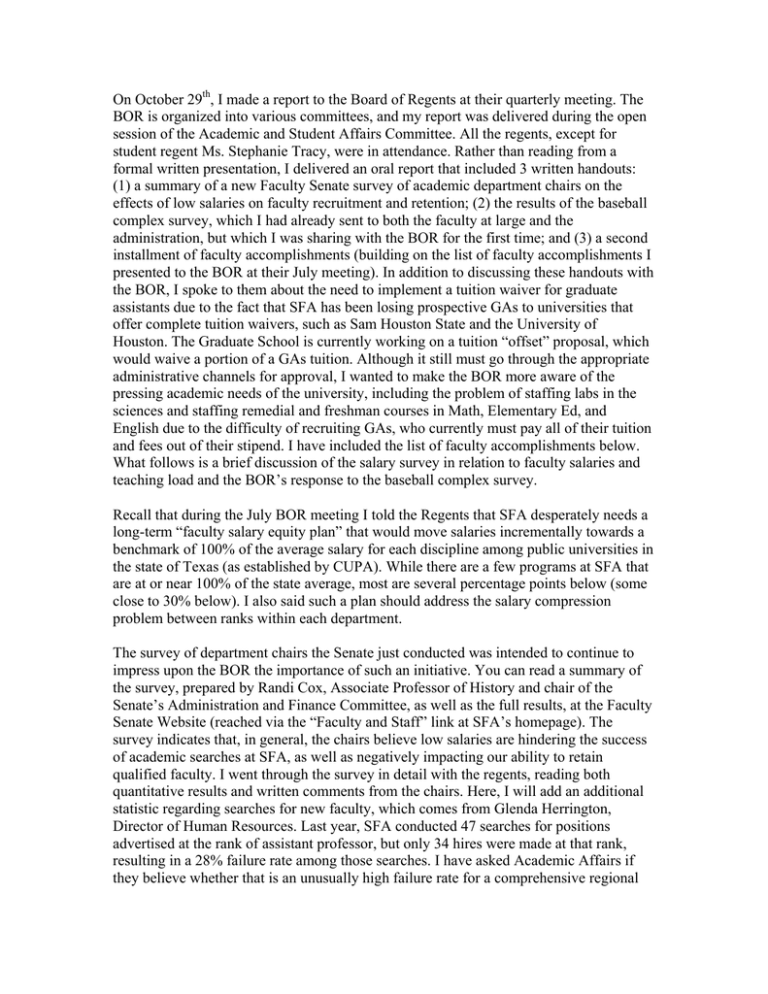
On October 29th, I made a report to the Board of Regents at their quarterly meeting. The BOR is organized into various committees, and my report was delivered during the open session of the Academic and Student Affairs Committee. All the regents, except for student regent Ms. Stephanie Tracy, were in attendance. Rather than reading from a formal written presentation, I delivered an oral report that included 3 written handouts: (1) a summary of a new Faculty Senate survey of academic department chairs on the effects of low salaries on faculty recruitment and retention; (2) the results of the baseball complex survey, which I had already sent to both the faculty at large and the administration, but which I was sharing with the BOR for the first time; and (3) a second installment of faculty accomplishments (building on the list of faculty accomplishments I presented to the BOR at their July meeting). In addition to discussing these handouts with the BOR, I spoke to them about the need to implement a tuition waiver for graduate assistants due to the fact that SFA has been losing prospective GAs to universities that offer complete tuition waivers, such as Sam Houston State and the University of Houston. The Graduate School is currently working on a tuition “offset” proposal, which would waive a portion of a GAs tuition. Although it still must go through the appropriate administrative channels for approval, I wanted to make the BOR more aware of the pressing academic needs of the university, including the problem of staffing labs in the sciences and staffing remedial and freshman courses in Math, Elementary Ed, and English due to the difficulty of recruiting GAs, who currently must pay all of their tuition and fees out of their stipend. I have included the list of faculty accomplishments below. What follows is a brief discussion of the salary survey in relation to faculty salaries and teaching load and the BOR’s response to the baseball complex survey. Recall that during the July BOR meeting I told the Regents that SFA desperately needs a long-term “faculty salary equity plan” that would move salaries incrementally towards a benchmark of 100% of the average salary for each discipline among public universities in the state of Texas (as established by CUPA). While there are a few programs at SFA that are at or near 100% of the state average, most are several percentage points below (some close to 30% below). I also said such a plan should address the salary compression problem between ranks within each department. The survey of department chairs the Senate just conducted was intended to continue to impress upon the BOR the importance of such an initiative. You can read a summary of the survey, prepared by Randi Cox, Associate Professor of History and chair of the Senate’s Administration and Finance Committee, as well as the full results, at the Faculty Senate Website (reached via the “Faculty and Staff” link at SFA’s homepage). The survey indicates that, in general, the chairs believe low salaries are hindering the success of academic searches at SFA, as well as negatively impacting our ability to retain qualified faculty. I went through the survey in detail with the regents, reading both quantitative results and written comments from the chairs. Here, I will add an additional statistic regarding searches for new faculty, which comes from Glenda Herrington, Director of Human Resources. Last year, SFA conducted 47 searches for positions advertised at the rank of assistant professor, but only 34 hires were made at that rank, resulting in a 28% failure rate among those searches. I have asked Academic Affairs if they believe whether that is an unusually high failure rate for a comprehensive regional institution in Texas and, if so, what role below-market salaries might play in the failure rate. I am hoping to receive a response from the Provost at the November 14th Senate meeting. Both Dr. Pattillo and Dr. Berry have told the Senate they fully support making faculty salary equity a strategic initiative of the university. However, Dr. Pattillo has stressed that the Strategic Planning Committee, which he has put in place, must determine its own process for arriving at a set of 5-6 initiatives based on university-wide input. One thing individual faculty can do to ensure that they give full consideration to faculty salary equity as a possible strategic initiative is to contact them via their electronic “comments form” (which can be reached from SFA’s homepage by clicking on the “Faculty and Staff” link and then on the “Strategic Planning Committee” link). The fact that Dr. Pattillo has appointed Ms. Valerie Ertz, Chair of the Board of Regents, to the SPC, bodes well for the implementation of its initiatives. If we can impress the importance of faculty salary equity upon the SPC, Ms. Ertz will then be in a position to directly influence the BOR to adopt a substantive faculty salary equity plan. But we as faculty must fully engage this process. The chair survey I mentioned above is aimed mainly at addressing the effects of low faculty salaries, but it also briefly addresses the issue of teaching load. Dr. Berry has told the Senate that SFA needs to find a way to meet both the need to raise faculty salaries and the need to create a more flexible teaching load policy that will allow for more research. In particular, he believes we need to give full consideration to moving to the type of teaching load policy Sam Houston State University adopted last year. Their new policy allows for a dual system whereby faculty in all colleges may choose a 3-3 or a 4-4 load (18 TLC for the fall and spring semesters, or 24 TLC for the fall and spring semesters), depending upon how productive they are at their research. All new hires are automatically placed on the 3-3 load, effectively making it a recruiting tool for new faculty. Established faculty may choose to remain on a 4-4 load or move to a 3-3 load, depending upon their research interests. The Senate has urgently told the administration that in order for SFA to continue to attract and retain quality faculty, we must allow all colleges to offer the option of a 3-3 load in addition to the standard 4-4 load. Before concluding with the list of faculty accomplishments I gave to the regents, I will attempt to describe the BOR’s reaction to the baseball complex survey and to put the issue into context. I presented the baseball complex survey after presenting the faculty salary survey in order to connect faculty resistance to building Bo Pilgrim Park to the crisis created by low salaries. I told them that the reason the Faculty Senate had conducted the survey was so that faculty opinion on whether Bo Pilgrim Park should be built will be taken into consideration by Dr. Pattillo in the event that the Athletic Department is unable to raise the $3.5 million necessary to issue bonds for the $14 million project. Dr. Pattillo has stated that the Athletic Department has until January 1, 2008, to raise private funding for 25% of the cost of Bo Pilgrim Park. This is the minimum amount of private funding required by the Coordinating Board before public bonds for the project can be issued. I told the regents that, as we have been informed that the amount of private donations has been standing still at around $2 million since May, we felt that the time had come for the faculty to weigh in on this issue. We had not yet made any public statement on it, and we felt that if we waited until January to do so we would already have lost the opportunity to influence the President’s decision on whether to go ahead with the project. I pointed out that the administration has repeatedly told the Senate that the only available discretionary source of revenue for debt service on the baseball complex bonds is designated tuition, which is also the main source for faculty raises. I noted that over half of SFA’s faculty responded to the survey, which is a high participation rate, and that 85% of respondents were against building a $14 million baseball complex in an environmentally sensitive location (at the corner of University Drive and East Starr Avenue in an area containing approximately 3 acres of wetlands). I noted that the most prominent theme among the written comments included in the survey results was that raising salaries to marketable levels is a more important priority than building the most expensive baseball complex in the Southland Conference. I concluded that in the view of the faculty, building Bo Pilgrim Park would be a mis-prioritization of scarce resources, which could be used more prudently for faculty salaries and other academic needs. No member of the BOR was willing to publicly acknowledge that the faculty’s concerns about the baseball complex are valid. The only public response came from regent Joe Max Green, who excoriated the Faculty Senate for conducting a survey on Bo Pilgrim Park. In his view, the Senate had divided the faculty from the BOR with the survey, which he believed would create a dangerous public image problem for SFA for which the Faculty Senate would be responsible. By conducting the survey, the Senate had in effect drawn a line in the sand and dared the BOR to cross it. Finally, the Senate acted in ignorance and does not fully understand the issue or appreciate the benefits Bo Pilgrim Park would bring to the community. I responded to him by stating that the Senate had done none of those things, and that the faculty has an important perspective on Bo Pilgrim Park that needs to be taken into account. I told him that, far from “drawing a line in the sand,” the Faculty Senate had not issued a resolution condemning the BOR for proceeding with Bo Pilgrim Park. Nor had we taken the survey to the media in an attempt to go around the administration and the BOR to generate negative publicity for the project. We had merely fulfilled our function of serving as a conduit to the administration and the BOR on faculty concerns and opinion. I also emphasized to the BOR that we were working within the established framework of shared governance that SFA has put into place. In short, by coming openly to the BOR with the baseball complex survey results, we were acting in good faith, acknowledging their role in governing the university while insisting we have valuable insight into the needs of the university. I told them that I believed they would use the input the survey offers to make the right decision for SFA on Bo Pilgrim Park in the event that the project has to be reevaluated in January due to a shortfall of private donations. I want to emphasize that baseball was only one of several topics I touched on with the BOR. And the baseball survey is just one of a number of initiatives the Senate has undertaken this year. As you know, we have also studied the effects of low salaries on faculty recruitment and retention. We are equally concerned with student recruitment and retention. At the Senate meeting this Wednesday, November 14th (2:30 in the Alumni Center), we will be hearing a report from Scott LaGraff, Assistant Professor of Music and chair of the Senate’s Academic Affairs Committee, delivered in conjunction with a presentation from Monique Cossich, Executive Director of Enrollment Management, on how faculty can become more involved in recruiting students to SFA. With the support of Dr. Berry, the Senate has also put together an advising assessment committee, which will be studying best practices in academic advising and ways that the quality of academic advising might be assessed across campus as part of a larger effort to increase student retention (which is hovering at around 64%--about 10 percentage points too low for a regional comprehensive university in Texas according to the Provost). To be sure, we are aware that each college has its own system for delivering academic advising. We have no interest in trying to prescribe how a college or department should deliver academic advising. Our only concern is to try to improve the outcome of academic advising by measuring student satisfaction of advising, promoting best practices in academic advising, and making sure that those faculty who are doing superior academic advising are rewarded for their service. I also want to emphasize that while Bo Pilgrim Park has become a lightning rod for discontent over low faculty salaries, it should not be perceived as a make or break issue for faculty at SFA. Last spring, I ascertained from Dr. Berry that if the entire amount of designated tuition that would go towards debt service and maintenance on Bo Pilgrim Park were to go to faculty raises, it would fund an across-the-board raise of approximately 1.5%. When added to a faculty member’s base salary (becoming part of the equation for future raises as well as annual income), 1.5% can add up to tens of thousands of dollars over the lifetime of a career. Nevertheless, this is hardly enough money to solve the salary crisis at SFA. Would losing this money to a baseball stadium hurt? Yes, given that SFA is 34th our of 35 public universities in Texas in average faculty salary but 13th in student head count. Would it make it even harder to solve the salary crisis? Certainly. But, however the baseball complex issue is decided, what I think the faculty need to focus on at this point in time is making faculty salary equity part of the long-term strategic planning process of SFA. Only then will we begin to get control of this problem. With that in mind, please contact the SPC through their electronic “comments form.” Remember, the BOR chair, Valerie Ertz, is a member of that committee. Also, bear in mind that 6 out of the 9 sitting regents were not on the Board when it voted to build a baseball complex. We have a fresh opportunity to help shape their vision of what is best for SFA. I truly believe that the BOR, including regent Green, wants the best for SFA. We need to continue to raise their awareness that what is best for SFA’s faculty is also best for its students. Now, here is the list of faculty accomplishments I presented to the BOR: LIST OF SFA FACULTY ACCOMPLISHMENTS presented to the SFA Board of Regents by Marc Guidry, Associate Professor of English and Faculty Senate Chair on October, 29, 2007 Last July, I presented you with a list of SFA faculty accomplishments in research and teaching in an effort to spotlight the positive contributions of the faculty to the University community as well as to their respective disciplines. These accomplishments enrich the classroom environment for students and enhance the University’s reputation regionally, nationally, and in some cases internationally. Without further ado, I present to you another list of faculty accomplishments. As was the case with the July list, this list is by no means an exhaustive resume of faculty accomplishments but a representative crosssection of the work of SFA’s faculty in each of our six colleges. ● Michael Tkacik, Associate Professor of Political Science, will be giving a briefing on Pakistan’s nuclear weapons program before high ranking officers of the United States Strategic Command at Offutt Air Force Base in Omaha, Nebraska, on 29 November, 2007. The occasion of his briefing arose out of a similar presentation in London at the Center for Strategic and International Studies, arguably the world’s preeminent international security think tank. Also in Political Science, Lee Payne, adjunct instructor, coauthored an article, “Child Poverty in the American States: The Impact of Welfare Reform, Economics, and Demographics,” which was recently published in Policy Studies Journal (2007). ● Stephen Lias, Associate Professor of Music, has composed a collection of songs called Songs of a Sourdough, about the lore of the Yukon Territory in northwestern Canada. The songs have been performed by baritone Scott LaGraff, Assistant Professor of Music, and will be released on LaGraff’s upcoming compact disk of songs by contemporary American composers for Centaur Records. ● Last July, I mentioned to you that the Department of Chemistry had been awarded nearly $200,000 in grants, despite working in outdated labs. Their commitment to performing beyond their means is also evident in several individual accomplishments, including Associate Professor Alyx Frantzen receiving the Teaching Excellence Award for the College of Science and Mathematics; chemistry student Kristen Baugh receiving the Eli Lilly/WCC Travel Grant Award through the American Chemical Society and the Clay Minerals Society Student Travel Grant; and the translation of Professor John Moore’s acclaimed vade mecum, Chemistry for Dummies, into two more languages (Dutch and German). ● The School of Nursing reports that their majors received a 100% pass rate last year on the licensing exam students must pass to become an RN. Also, they received a grant from the Rural Health Initiative that enabled them to purchase over $100,000 worth of Laerdal simulation equipment, used for simulating IV insertion on infants, children, and adults. The equipment enables the students to get computer feedback on how well they are performing on IV insertions. Finally, Cindy McCarley, Assistant Professor of Nursing, coauthored an article that recently appeared in Biological Research for Nursing on a pilot home study of temporal variations of symptoms in chronic obstructive lung disease. ● This semester, the Department of Elementary Education is testing the use of Webcams for remote supervision of Early Childhood through 4th grade Online teacher candidates. This is part of a Funds for the Improvement of Post Secondary Education (FIPSE) grant awarded by the Department of Education to the department in 2006. The equipment will enable Elementary Ed majors to get quicker and more useful feedback on their teaching. ● Christine Butterworth-McDermott, Assistant Professor of English, has published an article, “James’s Fractured Fairy-Tale: How the Governess Gets Grimm,” in the prestigious Henry James Review. Dr. McDermott’s article compares the structure of the Governess’s narrative in James’s Turn of the Screw to the classic fairy tales of the Brothers Grimm as part of an analysis of the psychological outlook of the complex and intriguing Governess. ● Owen M. Smith, Assistant Professor of Philosophy, led a study-abroad program to Greece last summer in which students visited several significant archaeological sites such as the Acropolis, the Agora, and the Theatre of Dionysus in Athens and the oracle and ruins at Delphi. The students also did projects on classical Greek literature. ● Leslie Cecil, Assistant Professor of Anthropology (part of the Department of Sociology) received a National Science Foundation grant for her work in Mayan archeology. She also coauthored a chapter on Post-Classic Mayan ceramic advances in Ceramic Research Advances (2007). ● Brian Oswald, Professor of Forestry, was elected national President of the Association for Fire Ecology and published two refereed papers this past year. ● Phil Stetz, Assistant Professor of Management, Marketing, and International Business, and Larry O’Neal, Associate Professor of Management, Marketing, and International Business, coauthored a study entitled A-1 Lanes and the Currency Crisis of the East Asian Tigers that has been adopted as a case study for a leading national entrepreneurship textbook. Their study is also being published in Entrepreneurship Theory and Practice (2008), a leading journal in the field. ● Students and faculty in the Foods, Nutrition, and Dietetics program worked with the East Texas Health Access Network at an area summer medical camp and participated in the Kids Health Fest 2007 in conjunction with the Child Health Partnership. They are also offering nutrition services through the new SFA Student Wellness Center. ● Perky Beisel, Assistant Professor of History, published a book on the history of horse breeding in Middle Tennessee from the late 18th c. to the present with Arcadia Press (2007). ● Debbie DuFrene, Professor and Chair of General Business, coauthored a revision to Business Communication (South-Western, 2008), a college-level textbook used at more than 130 colleges and universities in the U.S. and internationally. This is one of SouthWestern’s first textbooks to feature an e-book option in addition to the print version.
